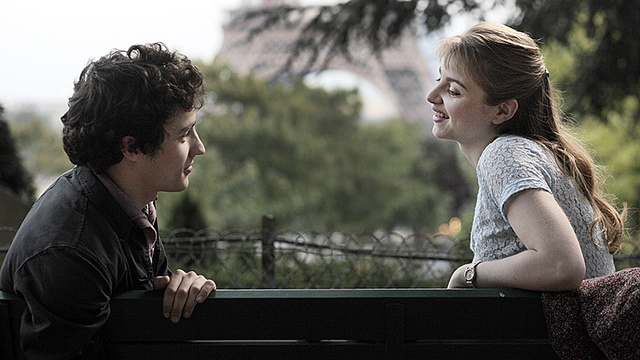Paul and Esther are young and in love—or at least in love with the idea of love. They’re in an art museum, contemplating a painting. Something about the image stirs Paul to an especially heated appreciation of his beloved, and he begins singing her praises, culminating in the words, “Your features contain the meaning of the world.” This is the way people should speak in real life, but too rarely do. Thankfully, we have French movies to fill in the gaps.
My Golden Days is a typically ardent example of the French coming-of-age film—maybe too typical at times, although it has surprises in store. Director Arnaud Desplechin arranges the picture as three remembrances of youth, recalled by middle-aged anthropologist Paul Dedalus (Mathieu Amalric). One episode is relatively brief, a childhood vignette in which young Paul’s mother dies and he learns how not to feel pain. The next section is the most unexpected—basically a mini-spy movie, in which Paul (played in youth by Quentin Dolmaire) goes on a high-school trip to the Soviet Union, and agrees to secretly carry cash to a group of oppressed Jews in Moscow.
This long sequence is every bit as suspenseful as Bridge of Spies, and with a bittersweet undertow: Paul also hands over his passport, which will allow a young Jewish man to escape Russia and live in the west under the name Paul Dedalus. Maybe that other Paul Dedalus will have a smoother existence than the real one, because our next—and by far longest—section casts Paul fully into the whirlpool of life. This period focuses on his devotion to Esther (Lou Roy-Lecollinet), the most popular girl in their provincial city. Paul manages to woo her, but then he is off to college in Paris, and affairs and torrid letters ensue (in this world, sex and letter-writing are equally fervent activities). With this passionate love story, Desplechin self-consciously follows in the footsteps of his filmmaking forebears, and when halfway through My Golden Days an offscreen voice abruptly begins narrating the action, it’s a nod to the tumbling narrators of Francois Truffaut’s incomparable films.
Desplechin’s output has been uneven, but when he’s on, he’s on. In my own absurd habit of compiling top-10 lists, he’s made two films that have been my #1 movies of their respective years: Kings and Queen in 2005, and My Sex Life … or How I Got Into an Argument in 1996. This new film is actually a quasi-prequel to My Sex Life, as Paul and Esther are characters in that one, viewed a decade later in their lives. (You don’t need to have seen My Sex Life to enjoy it.) My Golden Days doesn’t have the roller-coaster wildness of those two gems, although it approaches that quality in its uncomfortable epilogue, when the middle-aged Paul meets someone from his past. Maybe it relies a little too much on the staples of a certain strain of French cinema: young people, sex, philosophy, cigarettes, art. (When he introduced My Sex Life at the New York Film Festival in 1996, Desplechin admitted that “For a French guy, this sort of film is like a Western for Americans.”)
But this movie glows. We don’t know too much about what the 50ish Paul has been doing as an adult, except going to utterly remote places—he’s newly returned from years in Tajikistan—as though to escape whatever happened in the past, which he can’t do. The idea that the memories of My Golden Days are filtered through decades of life makes them all the more poignant; we view a sustained shot of Esther at a party, dancing, smoking, and lost in her own thoughts, not in the heat of youthful pleasure but as though it were a burnished memory, uncovered by this anthropologist as he digs through the history of his own life. Desplechin suggests that the past is never really distant, and that Tajikistan is not far away enough to flee from memories like this.
film@seattleweekly.com
My Golden Days, Northwest Film Forum, 1515 12th Ave., nwfilmforum.org . Opens April 22. Rated R.






